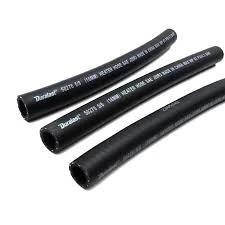ac compressor hose
Dic . 04, 2024 12:18 Back to list
ac compressor hose
Understanding AC Compressor Hoses A Critical Component in Your Vehicle's Cooling System
When the temperature rises and the heat becomes overwhelming, having a functional air conditioning (AC) system is essential for comfort in your vehicle. At the heart of this system lies the AC compressor hose, a crucial component that plays an integral role in the cooling process. Understanding the function, types, and maintenance of AC compressor hoses can help you ensure that your AC system operates efficiently and effectively.
What is an AC Compressor Hose?
The AC compressor hose is a vital part of your vehicle's air conditioning system, facilitating the transfer of refrigerant between various components such as the compressor, condenser, evaporator, and accumulator. Typically made of durable materials like rubber or reinforced nylon, these hoses are designed to withstand high pressure and temperature variations while ensuring a sealed environment for the refrigerant.
The AC system relies on the continuous circulation of refrigerant to remove heat from the cabin air. The compressor compresses the low-pressure gaseous refrigerant into a high-pressure gas, which then travels through the AC compressor hose to the condenser. In the condenser, the refrigerant releases heat and transforms into a liquid state before being sent to the evaporator, where it absorbs heat from the cabin air, creating a cooling effect.
Types of AC Compressor Hoses
There are generally two types of hoses in an automotive AC system high-pressure hoses and low-pressure hoses. The high-pressure hose carries compressed refrigerant from the compressor to the condenser, whereas the low-pressure hose transports the refrigerant back from the evaporator to the compressor.
1. High-Pressure Hoses These hoses need to withstand higher levels of pressure, typically ranging between 200-300 psi. They are generally reinforced to prevent bursting and ensure the safe transit of refrigerant.
2. Low-Pressure Hoses These hoses operate under relatively lower pressure, usually around 30-40 psi. They are designed to carry the refrigerant in its vapor form from the evaporator to the compressor.
Signs of Hose Failure
ac compressor hose

Over time, AC compressor hoses can degrade due to exposure to extreme temperatures, UV light, and the chemical composition of the refrigerant
. Common signs of hose failure include- Refrigerant Leaks If you notice a sweet smell or oily residue near the hoses, there may be a refrigerant leak. This can lead to a drop in AC performance and efficiency. - Cracks or Fraying Inspect the hoses for visible signs of wear and tear, such as cracks, bulges, or fraying. These conditions indicate that the hose may rupture soon. - Noise Unusual noises, such as hissing or whining, when the AC is running could indicate issues with the hoses or another component of the AC system.
Maintenance Tips
To maintain the efficiency of your vehicle's AC system and extend the life of the compressor hoses, consider the following tips
1. Regular Inspections Schedule routine checks on your AC system, particularly before the summer months. Look for wear signs in the hoses and ensure all connections are tight and secure.
2. Keep It Clean Ensure that the area around the hoses is free from debris and contaminants that could cause wear. Cleaning the exterior of the hoses can help you spot cracks more easily.
3. Use Quality Components When replacing any AC parts, including hoses, always choose high-quality components from reputable manufacturers to ensure reliable performance.
4. Professional Service Seek help from a professional mechanic for any repairs or replacements. Proper diagnosis and installation can prevent future problems down the line.
Conclusion
The AC compressor hose is a small but mighty component of your vehicle's air conditioning system. Understanding its functions and maintaining its integrity can ensure that you stay cool and comfortable, no matter how high the temperatures rise. By keeping an eye on your hoses and being proactive about maintenance, you can help to ensure that your vehicle's air conditioning system remains in peak condition for years to come.
